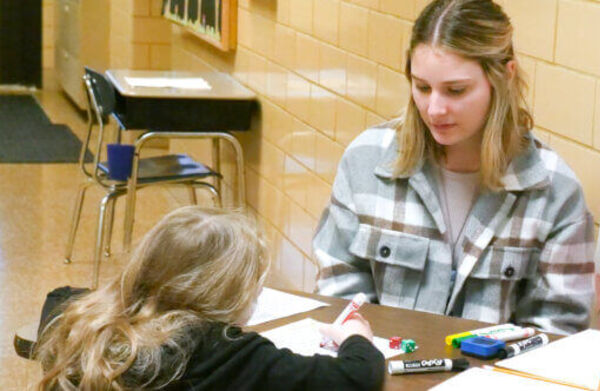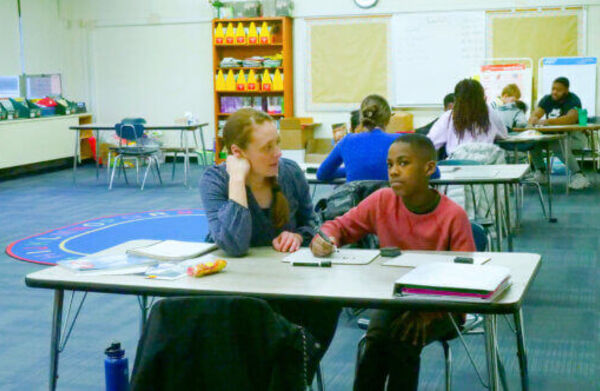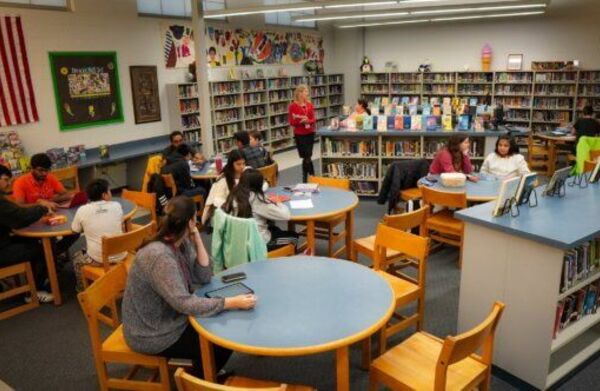Posted on
Marrying evidence with practice: how an Illinois-based partnership seeks to build tutor and teacher quality
Categories: Teaching Practice, Cognitive Science, High-Quality Instructional Materials, Policy and Advocacy, Pathways into Teaching
When Lucy Weber isn’t attending courses at National Louis University (NLU) for her Master’s in Teaching in Elementary Education, she’s choosing to spend as much time as she can tutoring young students through Reading Power, an early literacy nonprofit that partners with NLU to mobilize aspiring teachers as high-impact tutors in northern Illinois.
Teaching “has always been what I’ve wanted to do,” Weber says with a big smile, after wrapping a session with an energetic second-grade student at Lincoln Elementary School, a Reading Power school partner in Palatine, Illinois. Throughout the session, the young student jumps in her seat, swings her legs, looks around frequently, and chats excitedly. Weber is able to apply the evidence-based instructional practices she’s learned in her NLU coursework to this interaction through a calm, attentive, yet firm demeanor.
Having internalized today’s lesson about magic ‘e’ words – words that have an ‘e’ ending, signaling for short vowel sounds to become long vowel sounds – Weber navigates the student through grade-level books like The Ketchup King and Mr. Mustard Man, asking her to point out the magic ‘e’ words and prompting her to share examples and non-examples.

Related story: Fueling the fire of teaching desire
After the lesson, Weber logs onto one of several Reading Power laptops to track the student’s progress. She details what they read and worked on, how the student is progressing towards the learning goal, and what next steps are in their personalized learning plan. This information will be shared with the student’s teacher and parents so they remain aligned on how to best meet the student’s needs.
Tutoring opportunities are currently offered as optional for aspiring teachers at NLU. Given the quality of the program and the learning she receives at Reading Power, Weber believes it should be incorporated into the design of the preparation experience. She relishes the immense value and feeling of being better prepared to engage students in deep and meaningful learning. Due to NLU’s participation in DFI’s Learning by Scientific Design Network, she’s been completing instructional modules through coursework about teacher actions grounded in principles of learning science. Weber has been able to “try on” the teacher actions through tutoring – and has experienced meaningful results:
“The last action that we focused on [in the modules] was ‘attention to meaning’ and making sure that a lesson plan is consistent all the way through so that every part is focused on the learning goal,” she explains. “Knowing that in the back of my mind, I’m able to draw the student’s attention to the core material and not get distracted by other parts of the book that might be interesting but less relevant. That’s been super helpful.”

In addition to getting to put these learnings into practice, she also credits the quality of Reading Power’s training and support structure in building her confidence and decision-making as a future teacher:
Reading Power serves more than 700 students in preschool through second grade across northern Illinois, and boasts a high 90% retention rate of its tutors. Lisa Bulzoni, its CEO, credits the impact and success of the program to its commitment to evidence-based training and implementation – standards that parallel high-quality teacher preparation and in-service teaching. For example, their use of high-quality instructional materials, adherence to a research-based approach to learning structures, and thorough collection and analysis of student data are also best practices when it comes to teacher efficacy in supporting student learning growth in a classroom.
This focus on high-quality instruction and practice is something Carolyn Theard-Griggs, Dean of the National College of Education at NLU, seeks to prioritize in their preparation of future teachers. The college serves more than 3,000 students, including over 700 aspiring teachers.
“We look at instructional quality from a variety of lenses,” Theard-Griggs explains. “We make sure that all our programs are aligned to the specific standards that are required by the Illinois State Board of Education. We take on opportunities like DFI’s Learning by Scientific Design Network to really impact the way we do program evaluation, from assessment to course design to feedback from faculty, adjuncts, and students.”

And practice experiences like high-impact tutoring, she shares, are an important way for aspiring teachers to not only put instructional knowledge into practice but also to build their identity as teachers and better prepare them for the realities of the classroom:
Audio Transcript
It helps them, I think, one, build teacher identity, which I think we don't talk enough about. It's easy to feel like an imposter in your classroom when you start, if you have not been in classrooms and had experiences, successes and failures. And I think it really does bridge the gap between theory and practice. So you hear about how children develop, or you hear about key skills that students need to have, but until you're in the classroom watching, seeing it, interacting with it, it does not really come to life. And so in a lot of ways, teaching ends up being partly a profession that you have to learn doing it. You really do. I mean, we love our programs and we love what we're teaching them, and it gives them a foundation and an understanding for how to teach. But you have to do it. You have to try it. You have to figure out what worked, what didn't work, why it didn't work, why something that you learned in your foundations of education or your strategies, why something that seems proven doesn't work when you actually get to the classroom, because that happens too. And so it helps prepare them emotionally, mentally, professionally, academically for their first classroom, for their first teaching experience.Theard-Griggs also points out the value of high-impact tutoring in enacting immediate impact with students within a school community: “With Reading Power, what's really cool is because they log all the data in one space. The classroom teacher can also see the progress of the students. So you really have a model where there is a whole team of people supporting these students.”
While NLU teacher-candidates receive early and integrated practice experiences throughout their preparation, from observations to student teaching, the National College of Education is following in the footsteps of a growing number of teacher-preparation programs that are exploring including high-impact tutoring as an integral field experience for aspiring teachers like Weber to hone their practice.
“Tutoring is a great way to get yourself comfortable with the classroom setting – to communicate with students and establish relationships one-on-one, which is much easier to do than with 25 or 30 kids,” says Lisa Stukel, Academic Project Coordinator at NLU, who oversees the emerging tutoring initiative and partnerships.
Mobilizing the 600,000 aspiring teachers enrolled in teacher-preparation programs as tutors is a win-win solution that can both accelerate student learning and strengthen teacher pipelines – but only when program and tutor quality are prioritized.
In the national expansion and investment in tutoring as a solution for post-pandemic learning recovery, there’s been a surge in the number of tutoring providers – but also, unfortunately, immense variability in program quality. Many schools have turned to tutoring providers with negligible track records for supporting student success, which not only harms student learning but also poses a detriment to aspiring teachers who are serving as tutors. When future teachers are unable to follow evidence-based practices, these poor tutoring experiences can turn them off from teaching and, as a result, weaken the educator pipeline.
Fortunately, with the rollout of high-quality tutoring standards and increased national attention towards evidence-based instructional practices, a growing number of strong partnerships like NLU and Reading Power are emerging as examples of what’s possible. More and more aspiring teachers like Weber are accessing strong practice opportunities that can enable them to translate what they’re learning in coursework into on-the-job learning experiences – and successful long-term careers in teaching.

The rise in teacher-preparation programs investing in practice-based, instructionally-focused field experiences for candidates like tutoring is exciting news to Bulzoni, an NLU graduate and former teacher and school administrator:
“One of the best parts of being able to have students from NLU come in during their teacher preparation is to really have hands-on experiences with children,” Bulzoni says. “Our goal is that every child feels successful at the end of every day, and we want to make sure that these aspiring teachers have those moments. Being able to work through challenges with a child is very powerful as a student. And you'll remember that and be able to take that when you do your student teaching and when you eventually have your own classroom.”
Learn more about Reading Power and NLU’s teacher preparation programs.
Read DFI’s Mobilizing Aspiring Teachers as Tutors report to learn specific policy recommendations for state and federal leaders to ensure program and tutor quality so that students learn and tutors become strong teachers.
Related Stories:

Blog
Proving the possible: how an Ohio partnership is bringing tutoring to scale
Like many schools across the US impacted by the pandemic, Crim Elementary School in northwest Ohio..
May 24, 2023


Blog
From tutor to teacher: how Illinois’s state tutoring program is building local pathways into teaching
In a brightly-lit corner of the library at Rochelle Middle School, aspiring math teacher Angie...
March 09, 2023





